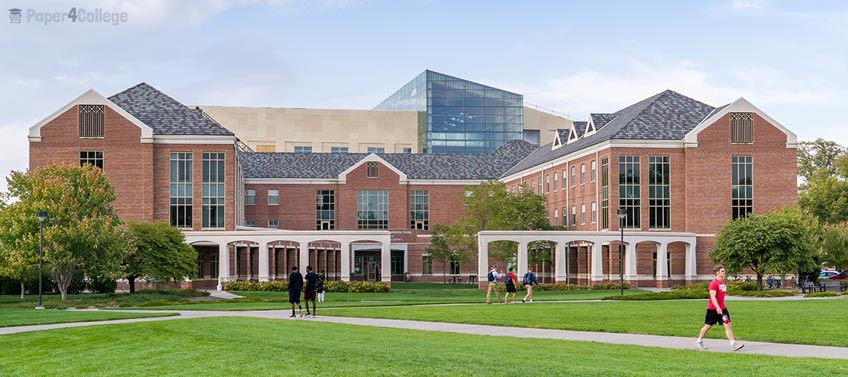Education: What For? Essay Sample

On one hand, there is an opinion that university should teach how to learn. University should give a student general skills that will help them find needed information and perceive critically everything they hear or see. On the other hand, knowledge gained at the university should be useful and the person should understand why they need it and how this knowledge can be used in life. The idea which we may call an idea of studying for yourself has lower popularity within many societies.
There may be many reasons of such opinions. One of them is that the system of higher education, which was formed in those countries, has its main task to give a student one concrete specialization. It means that a student studies one profession and not gaining general knowledge. In the twentieth century universities were tightly bounded with the labor market. Students acquired certain profession, did internships in accordant enterprises and became skilled workers for a specific industry. In the end of the twentieth century this situation changed. The labor market's change caused it. Completely different professions became popular and relevant. Unbelievable demand for many specializations, for example economic and law, has formed. Higher education became easier to achieve. One of the reasons was that now it was possible to study for money. It means that those who could not before enter the university because of lack of knowledge or place in the group were now studying there for money. However, the division of professions has not gone away. Till now the main question for future students is a question of profession. They do not think about what they want to study, they think who they want to be as a working person.

Unlike American and European universities, where education does not prepare students for work on a specific vacancy but rather gives them knowledge in certain sphere, in many universities of third world countries there are no general training programs. Students receive fundamental knowledge during first semesters and then they begin to learn highly specialized information and skills. Where does a philosopher plan to work? Why do you study philology if you are not interested in science? It is considered that the knowledge we gain should bring us practical use.
It is another question how good such educational system is. Most of the graduates from school are hardly fully aware of what really represents their future profession and what they are going to do on practice. Moreover, not everyone is entering the specialization of their dream. Many of them are controlled by their parent’s opinion or they choose the most needed specialization. Sometimes they choose a faculty depending on the amount of money they need to pay for it or because some relatives work there. As a result many are disappointed by their decision. If you go to some university and ask students who are on their third or fourth semester whether they like their specialization, a third part of them will probably say that they wish they have chosen to study in another place.
Of course, there are spheres where knowledge defines the following career of an individual. Graduates of medical faculty will most probably work somewhere in a sphere of medicine and health. Nevertheless, it is not a rule, even in European and American countries. Remember how much of your course or faculty mates are working in the sphere of their specialization? How many of graduates did use practical knowledge they got in their university? The biggest part of graduates does not work at spheres of their specialization. Does it mean that knowledge they gained during their years in university is useless?

It is considered in those societies that nowadays education is losing in price. It became achievable, that is why a general level of training is getting lower. Employers are more likely to give a vacancy to the person with the diploma, that is why many decide to study in order only to get the end certificate. They attend classes only to check off, they do not learn much, they only wait for the diploma to come. That is why many of them later have to learn again or complete certain courses. It would seem that the best way out of this situation is to learn "for soul". Diploma does not guarantee bright future anymore. It does not mean that you will immediately get a job or that you will have successful career. Is it so important that certain knowledge we gained by studying will be of use?
Of course, education in the twenty first century is still a luxury and a privilege. When you are choosing what and when to study, it is impossible not to think of usefulness of future experience and knowledge, no matter if it is a higher education, retraining courses or workshops. Nevertheless, it is one thing to make your own decisions, taking into account different factors. Quite another thing is to judge someone else's choice just because it may appear for us that a person does not use their resources rationally.
Remember your favorite subject at school or university. Is it related to your current job? My friend who works at famous magazine told me that the most remarkable experience from his years of studying was a class with literature teacher. This teacher was leading a course on Shakespeare's tragedies. It was his favorite class, although it did not have any practical use except if you want to be occupied with theater or literary studies. Was this class a luxury? Sure. However, it helped my friend to lead more mature and thoughtful life.

In those countries people are used to take their life as a history, which develops linearly. They understand what they are interested in when they learn at school. After that they find a job related to their specialization. However, nowadays we see that education has stopped being only one period in our life. It is never late for studying. It is not obligatory to study only due to practical necessity. There are a lot of people who like the process of learning. Someone has a possibility to be an eternal student. Someone wants to gain knowledge in a sphere, which is not related to their career. For example, Natalie Portman was studying psychology in Harvard, although she had already played a bunch of outstanding roles. Rowan Atkinson was occupied with electro technologies in one of Oxford's colleges. It is unlikely that someone of them was worried for not being able to practically apply their knowledge.
The world surrounding us is changing faster than every educational program. It is hard to talk about value of specific facts and data in the era when any information can be found in a few seconds via Google search or online libraries. It is more important not to just acquire information but to understand what it can give us personally, even when it does not have any empirical usefulness at first glance. That is why if you need courses on literary studies only in order to understand deeper your favorite books and a workshop on calligraphy just so that you could arrange your diary then why not?
